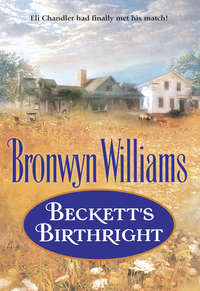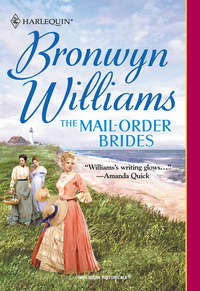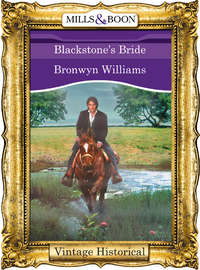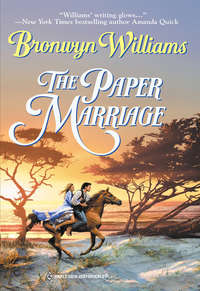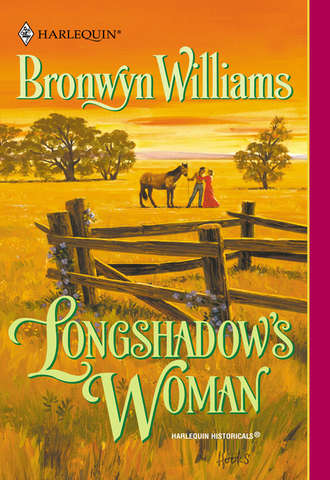
Полная версия
Longshadow's Woman
He was definitely limping. It had to be the leg irons. The heavy things allowed him to walk, but not to run. If the jailer hadn’t warned her not to remove them, she’d have been tempted to unlock them before this. He could work twice as hard if he could clamber in and out of stump holes more easily. But in that case, she’d be the one who was handicapped, with the gun in one hand and a bandage on the other. Besides, she suspected he knew she would never shoot him.
By then they had reached the yard. Uncertain how to proceed, Carrie came to a dead halt. “Whoa, there—you, too, Sorry.”
Jonah winced from the indignity of being addressed in the same manner as she addressed her mule. At least she hadn’t sworn at him the way she did Sorry. The mule was neither deaf nor stupid, but somewhat slow to make up his mind whether or not it suited his interests to obey.
Scowling, she stared down at his feet. Pride would not allow him to acknowledge his pain, just as pride would not let him reveal his understanding of her language. Caught in a trap of his own making, he had endured days of pain and humiliation, wondering why the stubborn woman couldn’t see the truth before her eyes—that a man couldn’t work in irons. That if she wanted to get her money’s worth before his parole ended, she’d do better to release him, sit on a stump with her rifle pointed at his head, and let him get on with clearing her field. If he had to follow the Plow Road, he’d as soon get it done as quickly as possible.
“Leg, um—hurt?” She pointed to his ankle, her pale eyebrows knotted in concern. Jonah had heard the jailer tell her she must return him in good condition. She was obviously worried about her investment.
He knew she carried the key in her pocket, along with the napkin in which she had wrapped two chunks of bacon and cornbread, which they had devoured at noon, sitting in almost companionable silence in the shade of the hedgerow. For a few moments he had felt almost as if they might be…not friends, yet not quite enemies.
To his astonishment, she dropped to her knees before him. When he felt her hand on his foot he stopped breathing, but he couldn’t restrain a soft oath when the irons dug into his raw flesh as she folded the two halves back on their hinges.
Seeing the blood caked with dust until it looked like mud, she crooned in dismay. “Oh, my mercy, oh, sweet Jesus, you’re torn all ragged.”
Closing his eyes against the fresh pain, he willed his mind to escape to another place, another time. For once, it didn’t help. With harsh, shallow gasps, he waited for the pain to recede. Yesterday he had torn strips from his shirt and tied them around his ankles to pad the irons, but the cloth had only stuck to his blood and dried, tearing away still more flesh when he moved. Crossing her line in the dirt floor of the barn, he had found a jar of hoof dressing and plastered both ankles with that.
“You’ll have to let me wash it and dress it with turpentine and sugar. Emma—that is, my friend who knows about these things, says that’s the best medicine.”
Still on her knees, she gazed up at him, her eyes dark with concern. Jonah felt as if he’d swallowed a fish bone. It had not yet pierced his gullet, but he was afraid something irreversible had just happened.
Her hand was still resting on the top of his dusty bare foot. Her own feet were bare, too. He had seen her wearing boots but once. They were worn through on the bottoms, good only for trapping rocks and sharp pine seeds against her naked feet.
His own feet were bare because the men who had come to arrest him had not allowed him to take away anything, not the papers that would prove his innocence, not his boots, not even the freedom papers he had received from Lieutenant Pratt.
“I’m sorry,” she whispered. “I know you can’t understand me, but I’d never have had this happen, not even to a wild animal. I saw a wolf once that chewed his foot off to get free of a trap, and…”
A wolf. He was no more than a wild animal, caught in a trap. He didn’t know whether to laugh or cry, but he did know that if she didn’t take her hand off his foot, he might do something they would both come to regret.
Leading the mule into the small fenced paddock, Carrie forked him a ration of hay and then led her prisoner toward the cabin. He was no longer shackled or chained, which meant that if he were going to escape, it would be now. He could knock her on the head, grab the rifle from her hands and take off through the woods.
Yet, something she’d seen—or fancied she’d seen—in those clear gray eyes of his, told her he wouldn’t try to escape. Not yet, at any rate. Without thinking, she had knelt in the middle of the lane to examine his injuries, just as she would have stopped to examine any wounded creature in her care. But the instant she’d touched his warm flesh, the strangest sensation had come over her. She had looked up—he had looked down—and for one brief moment something tangible had passed between them. Her only comfort was that he’d been as startled as she was.
Now she tried to think of a way to make him understand what needed to be done. “Now listen carefully,” she said in slow, measured tones. “I will help you.” She placed her hand over her heart. “You must not try to escape.” She pointed to the road and shook her head vigorously. “If you run away, you’ll die.” And then, all in a rush, she blurted out the fearful consequences. “You’ll end up with the blood poisoning and die out there in the woods all by yourself, and then the jailer will come after me and hold me responsible, and I’ll end up in jail in your place.”
But of course he couldn’t understand a word she said. Shaking her head, she said, “You sit.” She pointed to the three-legged milking stool she’d brought inside when the cow had gone dry and she’d traded her to a farmer in Snowden for a rooster, two hams and a side of bacon, and said, “You sit.”
He sat. They were both dirty after a day in the field, but he had rid himself of vermin. She’d broken off branches of wax myrtle and told him in words a child of three could understand how to use them to keep the fleas from his straw bedding. Evidently, he had taken her meaning.
“This is going to hurt,” she muttered. Lifting his foot in her hand, she felt again that peculiar awareness—like the quivery feeling of the air just before a lightning storm. Embarrassed, she glanced up to see if he had noticed anything.
He felt something, all right. His lips were clamped together and his eyes had the strangest expression. Maybe this was the way Indians looked when they were hurting. She’d never seen one up close before, not since the night they had come a-whooping and a-hollering into the settlement near Redwood Falls. Those had been Sioux. The sheriff had called this one a Kie-oh-way heathen. It had been more than ten years, but he looked different from the Indians she remembered. He was taller, for one thing, and his features were…
“Well. Enough about that,” she said decisively, earning a puzzled look from the man whose ankles she had just cleaned, treated and wrapped with strips of an old bed sheet. She was tempted to see what he would do if she asked him to help her rebandage her hand. Some things were hard to do one-handed, and the old bandage was in tatters after a day’s work. “I don’t reckon you could…?” Shaking her head, she answered her own question, “No, I reckon not.”
Jonah had learned long ago to lock away all emotion. He could not afford to think of the woman as anything more than a means of escape. A means of eventually clearing his name so that he could return to his land and his horses. She made it difficult, however, first by treating him with such disdain he wanted to shake her until her teeth flew in all directions—then by treating him not only with kindness, but with sympathy. It was enough to undermine his determination.
He told himself she was crazy. For all she knew he could be a murderer, yet she had brought him into her house and tortured him with her careless kindness. She had stared at his naked body that first day. She knew well that he was a man. She had scrubbed his wounds with her lye soap and mopped them with turpentine until his eyes watered with the pain. She had shared her food and water with him, sat beside him to share a patch of shade, yet she considered him less than an animal. A wolf caught in a trap. Not only deaf, but stupid.
The woman was crazy.
Chapter Three
Together the next morning they set fire to the pile of stumps, some of which were dry, a few still damp from the earth. When flames whipped through the heap and spread to the bigger stumps in the middle, they turned to one another with a look of shared triumph. Then, almost as if they were embarrassed, Jonah began gathering dead branches to toss on the fire, and Carrie began stepping off the length and breadth of the clearing for perhaps the hundredth time. The ground was hard, baked dry by weeks without rain. Scrubby vegetation had flourished once the tall trees had been cut down, allowing the sun to reach the ground. Those would have to be cleared next. Even as they worked, they both watched the burn pile carefully to see that the flames didn’t spread. When a finger of flames spilled out and began creeping through the dry grass, they both rushed to beat it out with tote sacks wet from the nearby creek.
With the fire once more under control, they stared at each other, sweaty, sooty, and triumphant. And there it was again. That shimmering awareness that made the world go utterly silent for one endless moment.
Silently, Jonah called himself a fool for staying as long as he had. He had meant to slip away at the first opportunity, but here he still was. Now, in exchange for food, a clean place to sleep and the occasional smile when the woman forgot herself, he was going to have to follow that damned plow and turn the earth so that she could plant her corn. He had not meant to linger so long.
She didn’t even know how he was called. The sheriff had called him Kie-oh-way. He had heard him call her Adams. Miss or Mrs. Adams? There was no man in her bed or at her table, but a man’s coat and shirt hung from a hook on the wall. Perhaps she had once had a man and he had died. Or perhaps he had thrown her away, as a Kiowa did if one of his wives displeased him. He could easily see how this woman could displease a man.
Yet he could also see how she might please a man….
“Now this,” Carrie informed him the next morning, “is what we call a plow.”
“It is also what I call a plow,” he wanted to say, but held his tongue. It had angered him at first when she forgot he was only an ignorant savage and spoke to him as if he were slightly more intelligent than her mule. Now it amused him.
Using pantomime to illustrate her words, she said, “What I aim to do is harness it to Sorry so that he can do the pulling, the way he did with the stumps.” Placing the worn straps over her own shoulders, she mimicked pulling the plow. “But you’ll have to steady it, else it’ll skitter over the top of the ground and fall over. I’d do it myself, but the thing’s got two handles and I’ve only got one good hand.”
He was curious about that. Her hand was still bundled up in a grimy rag, reeking of the turpentine she had used on his ankle that had burned down to the bone. She held it against her breasts now and then, as if it pained her. More than likely what pained her was holding that damned Springfield, which she insisted on carrying with her into the field, even though they both knew he could have easily escaped many times.
“I don’t reckon you know what the devil I’m saying, but I was ever one for talking, and you’re all I’ve got to talk to.” She pointed to the rusty plow. “Plow. Now, you try saying it. Plow.”
It was all he could not to laugh, but soberly, he repeated the word. “Plow.”
“Oh, that’s real good! We’ll have you talking in no time, you see if we don’t.” Her smile was as warm and encouraging as a pat on the head, as if he’d just retrieved the stick she had thrown.
So he followed her into the field, appreciating the way she walked in spite of his irritation, amused at the way she squared her hat on her head, then lifted it to fork her flyaway hair from her eyes. It was a man’s straw hat, ugly, but useful for one with skin so fair it reddened each day from the sun and faded by nightfall, leaving behind light brown speckles. She began each day with the sleeves of her dress covering her arms, but before the day was half over, she would turn up the sleeves and unfasten the buttons at her throat.
Gazing past the mule’s bony haunches, Jonah watched the way she moved, fascinated at how much a man could learn about a woman from the way she walked, the way she bent to chop at a stubborn shrub. Buoyed by hope and determination, she strode into the field each morning like a warrior riding into battle. Although he had to admit there was nothing at all warrior-like in the movement of her hips or the way her bosoms bounced under the thin covering of calico.
By the end of each day she drooped like a flower that had been plucked and cast aside. Plodding in from the field, it was all she could do to keep the rifle from dragging on the ground. He would have offered to carry it for her, but he suspected she might misunderstand his motives.
Irritating woman. Were all white women so contrary, or was it only this one small individual? The women of St. Augustine who had taught him to read and write had not affected him this way.
The problem, Jonah told himself, was not this particular woman. He would have reacted the same way toward any woman between the ages of fifteen and fifty, having been without the comfort of a woman’s body for so long. His blood still grew heated when he thought of the way he had dropped his clothes before her, standing ankle-deep in her creek. He had done it out of anger, out of resentment, wanting to shock her, to frighten her.
Instead, he had been the one who was affected. He’d had to turn away quickly and lower himself into the water.
Steering the white man’s plow, he told himself that evening, was not as bad as he’d feared. He understood the mule. The mule understood him. They worked well together. As for the woman, that was another matter. She walked beside him every step of the way, from one end of the clearing to the other, sometimes moving ahead to chop down a bush, or falling behind to crumble a handful of freshly turned earth in her hand. They would stop at the far end, drink from the jar of water she’d left there in the shade, then set out again.
“This is the first time I’ve tried planting a cash crop,” she confided. “Corn—well, everybody needs corn. Last year I had to buy corn. There’s still some left in the crib, but it’s old and buggy, and I have to grind it, and the grinder’s gone to blazes. It’s good enough for Sorry and the chickens, but with a decent harvest, I can take my corn to the mill and get it ground, and pay the miller with part of the crop. That’s the way we do it,” she said gravely, as if imparting a valuable tenet of her white man’s wisdom.
Jonah reminded himself of his promise to Lieutenant Pratt, that he would help the first white person in need he encountered. The Adams woman needed help all right. She was weak, injured and alone, yet no one came to her aid. There were houses within a few miles of her cabin, yet no one visited. She had mentioned a friend, but the friend had not come to help her plow her field. It was becoming increasingly obvious that she was an outcast. Jonah knew what it felt like to be an outcast.
“You might have noticed, I’ve been raking up leaves and piling them up out behind the chicken house.” She had fallen into the habit of conversing with him as if he were an ordinary, reasonably intelligent man. He had already learned two things about her. She was kind-hearted…and she was lonely. “Emma says if I can get me some oyster shells and dump them on the heap and then set it afire with some trash wood on top, it’ll make the sweetest kind of fertilizer. She says the land hereabouts is sour. It needs shelling, if I can find a Currituck fisherman willing to trade me a load of shells for corn or a few jars of wild honey.”
She chattered the way he sometimes talked to his horses, only he rarely used words. His horses understood his thoughts, and he theirs. It was a gift he’d been given as if to make up for being two halves and never a whole.
Soon he must leave, he promised himself, not for the first time. The hardest work was finished. She would use a planting stick in the month of the dogwood, and her corn would flourish. The land was rich, some of it was boggy, but all was fertile. He had read books on such matters once he had decided what he would do with his life.
“Lordy, I’m starvin’, aren’t you?” she said, mopping her damp, sunburned face.
“Lordy,” Jonah echoed solemnly, wondering why it was the white man called Indians redskins, when it was the white men themselves who turned red as his old Koitsenga sash from sunlight and whiskey. His own skin was more the color of a freshly tanned hide. Sun only deepened the color. Whiskey, he never touched, having seen what it did to his shipmates and too many of his own people.
They had taken to sharing the evening meal. She had not allowed him inside her house again since treating his ankles, but when she came outside to lock up her chickens and bring him his supper, she would often bring her own and join him, sitting on a plank bench outside the barn while he squatted on the ground nearby. Now and then she would speak, and he would nod and grunt in response, or lift his shoulders as if he didn’t understand, and she would shake her head and sigh her impatience with him. He had come to enjoy the game, even though he was beginning to feel guilty, yet how could he break the silence now? It had gone on too long. She would be angry with him for tricking her.
Angry enough to shoot him? He was all but certain the rifle was not loaded. Even loaded, it wasn’t much of a threat, for the barrel was so heavy she could hardly support it with her one good hand. She might shoot out one of her precious glass windows, but he no longer feared she would kill him, no matter what he did.
So why didn’t he simply walk away?
Jonah couldn’t answer. It was not the accommodations. The barracks in St. Augustine had been newer, cleaner and more comfortable, except for the mosquitoes. The food she provided, usually beans, sometimes greens, sometimes only cornbread soaked with bacon grease or honey, and on special occasions, a strip of fried side meat, was obviously the best she could offer, for she ate the same thing. It was filling and satisfying, but he would have enjoyed a meal of buffalo or venison, or even fish.
“Moon. See, coming up over yonder woods? It’s called a moon.”
The woman was not an idiot. Why did she insist on sounding like one?
But he knew why, of course. It was because she thought he had less intelligence than one of those stumps he had cut free of the earth and burned. It made him angry, and that very anger was a reminder that he had stayed too long. He had given the woman her money’s worth. The sooner he retrieved his papers, the sooner he could clear his name and get back to his own land.
And perhaps someday before he was too old, the gods willing, he could find a woman of his own. Another outcast, perhaps, who would not look down on him for his mixed blood.
The Adams woman had not gone to a church-house since he had been with her, yet he knew she had a day of the week when work was forbidden. A day to rest, according to the Jesus Rules. She had used her last Rest Day to pull up the withered bean vines outside her door and scrub the privy. While she raked the dirt around her house, with the chickens following after to peck at any bugs uncovered, Jonah had worked on repairing the barn and enlarging the fenced paddock. Then he had propped his feet on a tussock under a giant oak tree and allowed the warm, sweet air to flow over his body. Freedom had a taste—a flavor and a scent all its own.
Increasingly worried about his horses, Jonah knew he could not wait much longer. The mystery was why he had waited this long. He made up his mind to go on her next Jesus Day. He had fallen out of the habit of running since his imprisonment and his sailing days, but his ankles were nearly healed now. He was fairly certain he could run at least half a day, maybe longer, without needing to stop. He could take the mule, but stealing a mule was a hanging offense.
On the other hand, he would rather hang for something he did than for something he didn’t. Either way, he concluded, he would be back with his papers before she brought his supper.
When her Jesus Day came around, the woman was up before sunrise, harnessing Sorry to the cart. She set a napkin-covered basket in the cart, handed him a plate of bread, side meat and greens, and explained that she was going to visit her friend. “I’m going to trust you,” she said, her small, pink face so earnest he wanted to take it between his hands and reassure her. “I’m not going to lock you up, because I can’t think of a way to do it without using those miserable old irons, and I wouldn’t do that to a mad dog. But I cooked you some greens last night because a body needs greens to stay healthy, and I’ll bring back a jar of Emma’s peach preserves. You can have that to look forward to.”
Wearing a different dress from the one she wore every day—a faded yellow that bared her arms and throat, she stared at him as if waiting for a response.
He was tempted. By Daw-k’hee, the good mother earth, he was tempted.
But he only nodded his agreement. Watching her drive away a few minutes later, he set aside his conflicted feelings and concentrated on fixing directions in his mind. He had noted certain landmarks on his way north from the jailhouse. His sense of direction was well honed, both from instinct and from experience, but he had never traveled from this place to his own land. Asking directions would be risky.
Carrie’s hand was not healing. “Honey, I’m going to have to open it up again,” the old woman said, shaking her head. Carrie knew the procedure. Dreaded it like a bad toothache, but she knew it had to be done. So she washed Emma’s butcher knife, sharpened it on the stone, then held it in the candle flame until the edge glowed red.
She cried. Couldn’t help herself, and with Emma, she didn’t even try to pretend. She cried not only from the pain, but for what her life had become, for what it had been before, which was both better and worse—and for the glimpse of something more wonderful than anything she could have imagined.
Something she would never have.
While she sat with the basin on her lap, allowing the blood and pus to flow from her ragged hatchet wound, she told the old woman about her prisoner. “I know it’s only because I’m there alone so much, but it’s almost like having another friend. I don’t even know his name, but he’s got the clearest gray eyes. I’ve seen him smile, mostly when he doesn’t know I’m watching. And Emma, he’s got the whitest teeth.”
“Mmm-hmm. A woman can’t help but think, as long as that’s as far as it goes.” It was clearly a warning, and Carrie took it in the spirit in which it had been offered. Her own mother would have probably done the same.
Emma Tamplin was a small woman, barely four and a half feet tall. Having once been wed to a successful farmer who had gone to war when the Yankees had invaded the south, she had lost everything—husband, home, children—everything except for her dignity, her wisdom and her kind heart.
All of which Carrie had come to value enormously. Trying hard to ignore the throbbing of her hand that went all the way up to her shoulder, she said, “I know, I know—I’m being foolish. But Emma, following him in the field every day, watching the way he works so hard—Why, if Darther ever put in a single day’s work, I swear, I’d fall over in a dead heap, but my prisoner works like it was his corn we’d be planting come spring.”
“Any man worth his salt would rather be outside in the fresh air than rotting away in jail.” Emma’s husband had died in a Yankee prison. To this day she couldn’t bear to see things penned up if she could possibly help it. “I’m going to poultice you with my special salve, if you’ll hand me that there jar over there on the dresser.”


